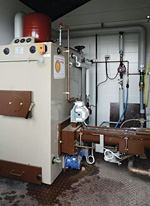Reasons for changing to woodfuel
A desire to reduce heating bills and a commitment to reducing
carbon emissions were the key drivers for changing from fossil fuel
to woodfuel.
Although the heating system did not need to be replaced, a
dramatic rise in the cost of gas provided the financial impetus to
make the change. Even when prices dropped the economic advantage
still remained. An additional benefit is that wood fuel prices are
more stable and predictable.
System features and benefits

The Eco Park is the first example of a wood fuel
district heating scheme in Angus.
Heat is distributed via an underground pipe network from a
single centralised boiler to each of the business units. As hot
water travels round the network, it is drawn off to heat each unit
as its heating is switched on. District heating schemes have a
number of advantages:
- Cost effective - a single boiler, boiler house and fuel store
can supply many properties
- Highly energy efficient due to heat recovery system
- No accumulator tank is required as the pipe network acts as a
mini accumulator
- Delivered heat to each user is measurable and accurate, and
allows individual billing
Wood fuel supply
Heat is provided through an energy services company (ESCo) -
Angus Biofuels - under a 10-year contract.
Wood chip is delivered from a chipping plant less than three
miles away, once a week in winter. every 3 weeks in
summer.
Lessons learned
- Underground heating mains costs can be significant and should
be costed accurately
- Three-phase electricity connection cost can be a large
proportion of expenditure
- Containerised systems can ease design approval under local
planning regulations
- Early communication and support from the local authority and
other regulatory bodies could reduce project delays
Facts and figures
Note: figures are approximate
| Building |
| Heated area |
650 m2 |
| Heated volume |
1,560 m3 |
| Fabric |
Lime floors, slate roof and timer frame, larch cladding with
sheep wool installation |
| Heating system |
| Boiler manufacturer |
Veto |
| Maximum boiler output |
150 kW |
| Fuel type |
Wood chips |
| Fuel specification |
- Moisture content: <30% (M30)
- Particle size: 80% of particles <16 mm (P16)
|
| Store capacity |
5 tonnes (15 m3) |
| Back-up/top-up system |
Original gas system retained |
| Fuel consumption, costs and savings |
| Annual wood fuel use |
75 tonnes |
| Annual energy consumption |
300,000 kWh |
| Annual CO2 savings |
70 tonnes |
| Wood fuel cost |
5p per kWh through ESCo contract |
| Fuel cost saving at 2008/09 prices |
£8,000 |
| Payback period |
10 years |
| Installation cost and funding |
| Boiler system |
£147,800 |
| Funding source |
Scottish Biomass Heat Scheme |
| Funding support rate |
40% of additional costs of woodfuel system |
Please note:
When this woodfuel system was installed, the UK Government
Renewable Heat Incentive (RHI) scheme did not exist. The RHI is now
available and commercial woodfuel heating installations can receive
payments based on metered heat produced for 20 years.
If this project were eligible for the RHI, it could generate up
to £19,214 of income per year, based on 300,000kWh of heat
delivered per annum. This income could be combined with any savings
made over displacing fossil fuels to give a very potentially
attractive payback period.
Projects installed pre July 2009, or that have received public
grants for their boilers from other sources (unless they
have paid them back) are not eligible for the RHI.
When this woodfuel system was
installed, the UK Government Renewable Heat Incentive (RHI) scheme
did not exist. The RHI is now available and commercial
woodfuel heating installations can receive payments based on
metered heat produced for 20 years. If this project were
eligible for the RHI, it could generate up to £19,214 of
income per year, based on 300,000kWh of heat delivered per annum.
This income could be combined with any savings made over
displacing fossil fuels to give a very potentially attractive
payback period. Projects installed pre July 2009, or that
have received public grants
for their boilers from other
sources (unless they have paid them back) are not eligible for the
RHI.